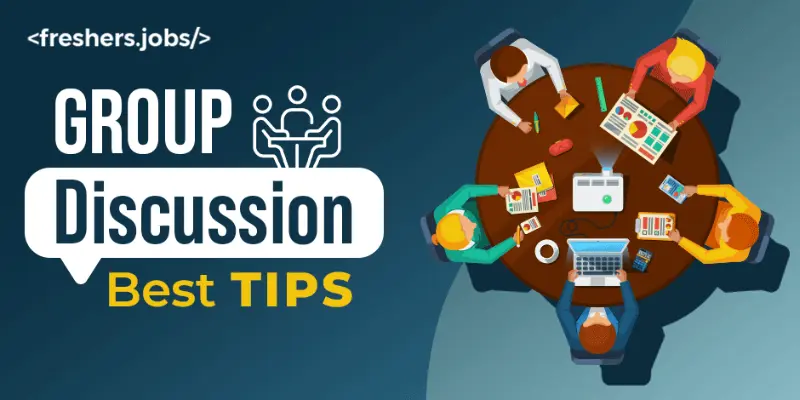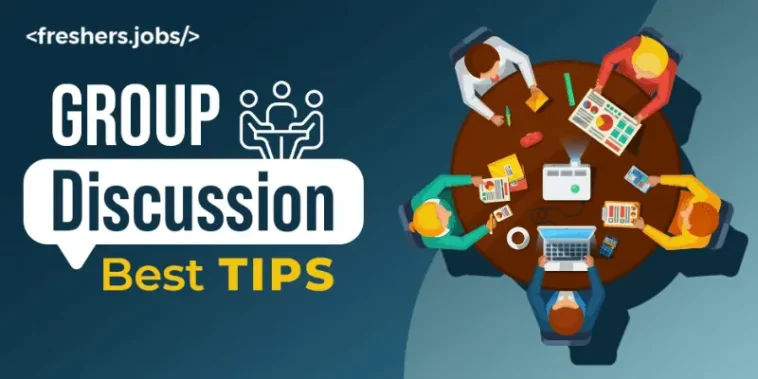
If you are a college fresher and have applied for jobs in several organisations, it is important for you to know the various levels of an interview. Group discussions are an integral part of job interviews. They are used as a yardstick to assess your communication and interpersonal skills. So, when preparing for personal interviews, you should equip yourself to participate in group discussions. This blog presents you with some handy group discussion tips that help you perform better and make you stand out from your competitors. Let us get into the details.
Group Discussion – The Purpose
You need to work on your communication skills to make your conversations with peers and interviewers comfortable during interviews.
- Communication Skills: This is a big one! They want to see how clearly and effectively you articulate your thoughts, listen to others, and respond thoughtfully. Can you express your ideas concisely? Do you use appropriate language?
- Teamwork and Collaboration: Group discussions simulate a team environment. Interviewers observe how you interact with others, whether you’re a good team player, if you respect different viewpoints, and if you can work towards a common understanding.
- Leadership Potential: While not everyone needs to be a leader, they’re looking for individuals who can take initiative, guide the discussion constructively, and motivate the group. Do you step up when needed? Can you summarize points and move the discussion forward?
- Problem-Solving and Critical Thinking: The topic of the discussion often requires participants to analyze information, think critically, and propose solutions. Interviewers assess your ability to understand the problem, contribute relevant ideas, and reason logically.
- Assertiveness and Confidence: They want to see if you can confidently express your opinions without being aggressive or dominating. Can you stand your ground respectfully? Do you believe in your ideas?
- Listening Skills and Respect for Others: It’s not just about talking! Interviewers pay close attention to how well you listen to others’ points, acknowledge their contributions, and respond respectfully, even if you disagree.
- Handling Pressure and Conflict: Group discussions can sometimes get heated. Interviewers observe how you handle differing opinions, manage conflict, and maintain composure under pressure.
GD Topics For Interview
Current Affairs & Social Issues:
- Impact of Social Media on Society
- Work From Home: Benefits and Challenges
- The Future of Education: Online vs. Offline
- Climate Change: Who Should Take Responsibility?
- How Artificial Intelligence affect Everyday Life
- Is Technology Making Us More Isolated?
- The Importance of Mental Health Awareness
- Globalization: Pros and Cons
- The Gender Pay Gap: Causes and Solutions
- The Future of News and Journalism
Economy & Business:
- The Impact of Inflation on the Common Person
- The Rise of E-commerce: Threat or Opportunity for Traditional Businesses?
- Is Cryptocurrency the Future of Finance?
- The Importance of Innovation in Business Growth
- Sustainable Development vs. Economic Growth
- How do Startups help in improving the Indian Economy
- The Ethics of Automation and Job Displacement
- Consumerism: Driving Force or Social Problem?
- The Future of the Gig Economy
- The Impact of Geopolitical Instability on Global Markets
Abstract & Opinion-Based:
- Change is the Only Constant
- Success is a Journey, Not a Destination
- The Pen is Mightier Than the Sword
- Smart Work vs. Hard Work
- Time is Money
- Necessity is the Mother of Invention
- Can Honesty Be a Bad Policy?
- Dreams vs. Reality
- The Customer is Always Right – Myth or Reality?
- Leadership vs. Management
Group Discussion Tips
Let us see some important tips that would help you navigate the group discussion round of any interview and emerge with success. Latest Job Alert on various jobs across industries can be found in job sites.
- Initiate Smartly: If you have a clear understanding of the topic being discussed, consider taking the lead to start the conversation. A confident and well-articulated opening statement can make a strong first impression. However, ensure your initiation is relevant and sets a positive tone for the discussion, rather than just being the first to speak.
- Listen Actively: Engaging in active listening is crucial. Pay close attention to the points made by other participants, understanding their perspectives and the reasoning behind them. This allows you to respond thoughtfully and build upon their ideas, rather than simply waiting for your turn to speak.
- Contribute Meaningfully: Focus on the quality of your contributions over quantity. Ensure your points are relevant to the topic and offer a fresh perspective or valuable insight. Avoid repeating what has already been said; instead, try to add a new ideas to the discussion.
- Be Clear and Concise: When you speak, aim for clarity and conciseness in your language. Articulate your thoughts directly without unnecessary jargon or lengthy explanations. This ensures your points are easily understood and respected by the other participants and the evaluators.
- Support with Facts: Whenever appropriate, try to support your arguments with brief factual information, examples, or general knowledge. This adds credibility to your points and demonstrates a broader understanding of the subject matter. However, ensure the facts are accurate and relevant to the ongoing discussion.
- Respect Others’ Views: It’s important to maintain a respectful attitude towards the opinions of other group members, even if they differ from your own. Acknowledge their points politely and try to understand their perspective. Disagreeing respectfully and constructively is a sign of maturity.
- Manage Conflicts Diplomatically: Disagreements can naturally arise in a group discussion. When they do, try to handle them diplomatically. Focus on the issue at hand rather than personal attacks, and attempt to find common ground or a mutually acceptable resolution.
- Summarize and Steer: If the discussion seems to be drifting away from the main topic or becoming disorganized, take the initiative to summarize the key points discussed so far. This helps to bring clarity and can gently steer the conversation back on a productive path.
- Maintain Positive Body Language: Your non-verbal cues play a significant role in how you are perceived. Maintain good posture, make appropriate eye contact with other participants, and display an engaged and confident demeanor throughout the discussion.
- Speak Assertively, Not Aggressively: Express your opinions and ideas with confidence and clarity, but avoid being pushy or dominating the conversation. Assertiveness involves stating your views firmly while still respecting the space and opinions of others.
Additional Tips for Approaching GD Round:
- Have well-reasoned perspectives on various topics.
- Participate in mock group discussions to get comfortable with the format.
- Pay attention to what others are saying.
- Value different viewpoints and avoid interrupting.
- Organize your points logically.
- Add value to the discussion with insightful comments.
- Stay calm and polite, even if disagreements arise.
To conclude, if you can follow the above-mentioned tips during your preparation process, you can successfully pass through the group discussion round of any interview and advance to the further rounds. Stay positive and face your interviews with extreme confidence! Freshers Jobs information on several jobs are available in dedicated job websites.



